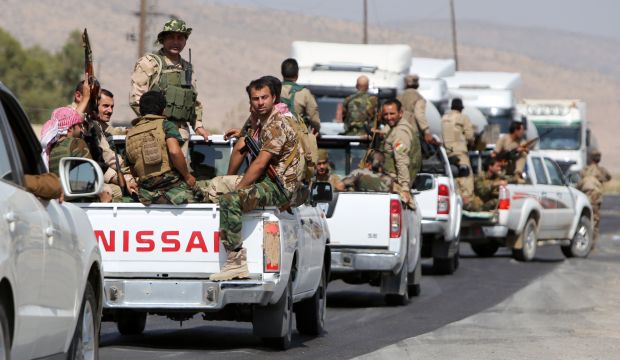
Iraqi Kurdish Peshmerga fighters head to the Mosul dam that they recaptured from the Islamic State of Syria and Iraq (ISIS) on August 17, 2014. (AFP Photo/Ahmad Al-Rubaye)
Baghdad, Asharq Al-Awsat—An official in Iraq’s Anbar province warned that another key dam was under threat from the Islamic State of Iraq and Syria (ISIS) on Monday, and called for US airstrikes on militants to protect it.
Falih Al-Issawi, the deputy head of Anbar’s Provincial Council, told Asharq Al-Awsat that the council is “considering a request for American intervention, even if by air, due to the danger of Haditha Dam falling under the control of ISIS.”
Issawi said the council requested help from the government because Haditha Dam was as important as Mosul Dam, particularly as it is much closer to Baghdad, and ISIS control of it therefore poses a threat to the capital and the central and southern areas of the country.
The dam, which regulates the waters of the River Euphrates, is located north of the city of Haditha, approximately 150 miles (240 km) northwest of Baghdad.
It is a major source of hydroelectricity for Iraq’s national grid behind Mosul Dam, which was recaptured by Kurdish and Iraqi forces backed by US air power on Monday.
The warning comes in the wake of attempts by Anbar Governor Ahmad Al-Dulaimi to win extra support from the central government for the province’s tribes, in order to recruit them into joining Baghdad’s efforts against ISIS.
The governor recently held meetings in Baghdad with senior officials, including President Fuad Masoum.
In his meeting with Dulaimi and the head of the Iraq Awakening Conference, Ahmed Abu-Risha, Masoum said he supported the governorate’s fight against terrorism and stressed “the importance of bringing government and popular efforts together to defeat terrorism.”
In what was seen as a gesture of good will by Anbar tribes to prime minister-designate Haider Al-Abadi, Issawi said: “Many issues will change on the ground in the near future especially as more tribes have joined the government’s military effort to expel ISIS and restore security to the governorate.”
Anbar Police Chief Maj. Gen. Ahmed Sadak announced the liberation of new areas of the governorate by government and tribal forces, including Bouathia and Hamdiyah. The areas of Kilometer-18 and Oqda west of Ramadi were also cleared of ISIS insurgents on Monday, he said.
Meanwhile, a senior member of the Constituent Assembly of the Sons of Iraq, Faris Ibrahim, told Asharq Al-Awsat that the “government and tribal effort has been ongoing for a while but not as effectively as it is today.”
Ibrahim criticized the military, “which slowed down in a number of areas of Anbar and has not shown the same level of determination as ISIS forces.”
In response to a question about the decision to have more tribes join the government in its fight against ISIS and whether this would benefit Abadi, Ibrahim said: “My belief is that the tribes which started joining government efforts were looking for a reason to do so because they saw for themselves the crimes committed by ISIS, even against those who were on its side, but had slight disagreement with its views.”
